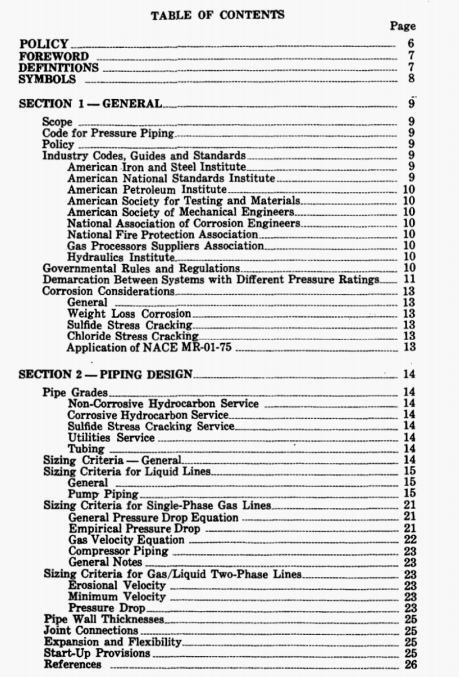API RP 14E:2007 pdf download.Recommended Practice for Design and Installation of Offshore Production Platform Piping Systems.
2.1 Pipe Grades.
a. Non-Corrosive Hydrocarbon Service. The two most commonly used types of pipe are ASTM A106, Grade B, and API 5L, Grade B. Seamless pipe is generally preferred due to its consistent quality. ASTM A106 is only manufactured in seamless while API 5L is available in seamless, electric resistance welded (ERW) and submerged arc welded (SAW). When use of Grade B requires excessive wall thickness, higher strength pipe such as API 5L, Grade X52, may be required; however, special welding procedures and close supervision are necessary when using API 5L, Grade X46. or higher.
Many of the grades of pipe listed in ANSI B31.8 are suitable for non-corrosive hydrocarbon service. The following types or grades of pipe are specifically excluded from hydrocarbon service by ANSI B31.3:
(1) All grades of ASTM A120.
(2) Furnace lap weld and furnace buttweld.
(3) Fusion weld per ASTM A134 and A139.
(4) Spiral weld, except API 5L spiral weld.
b. Corrosive Hydrocarbon Service. Design for corrosive hydrocarbon service should provide for one or more of the following corrosion mitipting practices (1) chemical treatment; (2) corrosion resistant alloys; (3) protective coatings (See Paragraph 6.5.b). Of these, chemical treatment of the fluid in contact with carbon steels is by far the most common practice and is generally recommended. Corrosion resistant alloys which have proven successful in similar applications (or b suitable laboratory tests) may be used. If sue alloys are used, careful consideration should be given to welding procedures. Consideration should also be given to the possibility of sulfide and. chloride stress cracking See Paragraphs 1.7.c and I.7.d). Adequate provisions should be made for corrosion monitoring (coupons, probes, spools, etc.) and chemical treating.
c. Sulfide Stress Cracking Service. The following guidelines should be used when selecting pipe if sulfide stress corrosion cracking is anticipated:
(1) Only seamless pipe should be used unless quality control applicable to this service has been exercised in manufacturing ERW or SAW pipe.
(2) Cold expanded pipe should not be used unless followed by normalizing, quenching and tempering, tempering, or heat treatment as described in 2.1.c(4).
(3) Carbon and alloy steels and other material.. which meet the property, hardness, heat treatment and other requirements of NACE MR-O1-76 are acceptable for use in sulfide stress cracking service.
(4) Materials not meeting the metallurgical requirements of NACE MR-O1-75 may be used; however, usage should be limited to applications or systems in which the externalenvironment and.
API RP 14E:2007 pdf download
